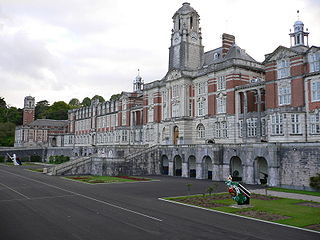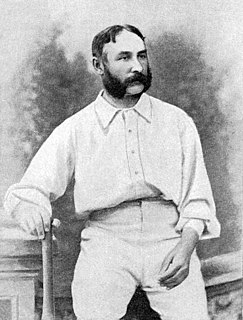This page is based on this
Wikipedia article Text is available under the
CC BY-SA 4.0 license; additional terms may apply.
Images, videos and audio are available under their respective licenses.

William Gilbert "W. G." Grace, was an English amateur cricketer who was important in the development of the sport and is widely considered one of its greatest-ever players. Universally known as "W. G.", he played first-class cricket for a record-equalling 44 seasons, from 1865 to 1908, during which he captained England, Gloucestershire, the Gentlemen, Marylebone Cricket Club (MCC), the United South of England Eleven (USEE) and several other teams.
William Mitchell may refer to:

Britannia Royal Naval College (BRNC), commonly known as Dartmouth, is the naval academy of the United Kingdom and the initial officer training establishment of the British Royal Navy. It is located on a hill overlooking the port of Dartmouth, Devon, England. Royal Naval officer training has taken place in Dartmouth since 1863. The buildings of the current campus were completed in 1905. Earlier students lived in two wooden hulks moored in the River Dart. Since 1998, BRNC has been the sole centre for Royal Naval officer training.
William Brown may refer to:

Edward Mills Grace was an English first-class cricketer in the second half of the 19th century who was an all-rounder, batting right-handed and bowling slow right arm underarm. He played for Gloucestershire County Cricket Club and was the elder brother of W. G. and Fred Grace. All three played for England against Australia in September 1880 two weeks before Fred Grace died. Always known by his initials, E. M. Grace controversially held amateur status but was criticised for the money he made by playing.
William Young may refer to:

The Commander-in-Chief, The Nore was an operational commander of the Royal Navy. His subordinate units, establishments, and staff were sometimes informally known as the Nore Station or Nore Command.

The Tudor navy was the navy of the Kingdom of England under the ruling Tudor dynasty (1485–1603). The period involved important and critical changes that led to the establishment of a permanent navy and laid the foundations for the future Royal Navy.
Henry Roberts may refer to:
William Adams may refer to:
Henry Martin may refer to:
Events from the year 1797 in Great Britain.
Henry Hill was an ex-Mafia associate who was the basis for the film Goodfellas
Gorringe is a rare English-language surname, possibly derived from the village of Goring-by-Sea, Sussex.
The Grace family was an English cricketing family. Fourteen members of the family played first-class cricket, with brothers W. G., E. M. and Fred Grace all going on to play Test cricket for England

The Royal Naval College, Greenwich, was a Royal Navy training establishment between 1873 and 1998, providing courses for naval officers. It was the home of the Royal Navy's staff college, which provided advanced training for officers. The equivalent in the British Army was the Staff College, Camberley and the equivalent in the Royal Air Force was the RAF Staff College, Bracknell.
Henry Wheeler may refer to:
The King's Birthday Honours 1943 were appointments by King George VI to various orders and honours to reward and highlight good works by people of the British Empire. They were published on 2 June 1943 for the United Kingdom and Canada.






